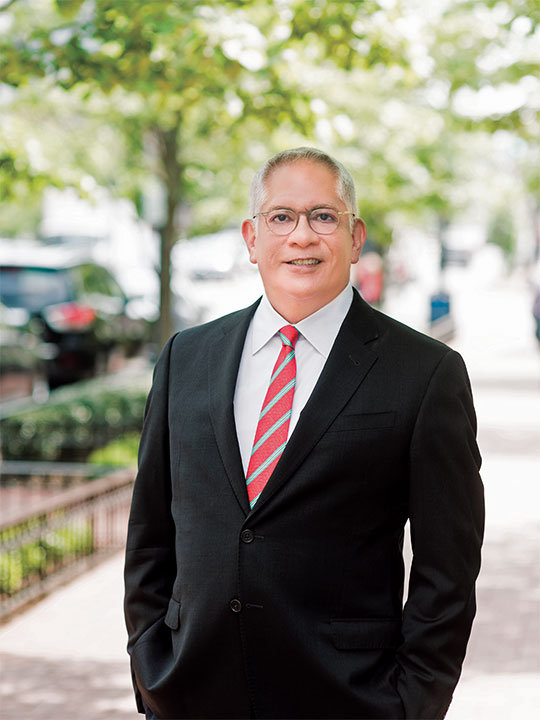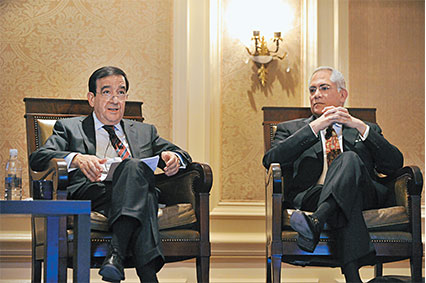Rick Roldan’s NPGA exit interview
By Rick Roldan’s estimation – and based on conversations he’s had with other national trade association CEOs – he was expected to lead the National Propane Gas Association (NPGA) for only a handful of years.

Roldan. Photo courtesy of Rodney Choice.
“The typical person in this line of work probably stays in a job five to seven years and tries to move on and up,” Roldan says. “That was my early expectation – to follow that career path.”
But the nature of the propane industry tends to change one’s thinking and also one’s career. So, a five-year stay at the helm of NPGA turned into 17 years. In fact, when Roldan steps down as president and CEO at the end of this year, he will have been with the association in some capacity for nearly 26 years.
“There’s something unique about this industry that causes people to stay faithful to it and be in it for the long haul,” says Roldan, 59, who points to the industry’s family nature.
“Your satisfaction with your job is not all derived from compensation,” he says. “Something has to drive how you feel about your job and your place in the organization. In our case, it has to do with this industry.”
Mutual decision

NPGA President and CEO Rick Roldan. Photo courtesy of Rodney Choice.
NPGA announced its decision at the winter board of directors meeting to move beyond 2019 without Roldan, who says the decision was “jointly made and mutually arrived at.” He will stay on staff until Dec. 31, 2019, and help with the transition to his yet-to-be-named successor.
Addressing the board in Charleston, South Carolina, Roldan said, “This is a good time to begin a transition to a new generation of leadership.”
Also at the winter board meeting, Chris Earhart, NPGA chairman from Virginia-based Dixie Gas & Oil, said the association would review its strategic plan and the organization overall to build a foundation for the future.
“Not that where we’ve been is wrong,” he said. “Times change and directions change. This will be a good time for us to look.”
Rather than assign any significance to his decision, Roldan prefers to look back and say “how lucky I was to hook up with a great industry and stay with it for such a long period of time.”
NPGA’s long list of former chairmen and volunteer leaders is a contributing factor to the longevity he’s enjoyed in the industry, Roldan says.
“One of the things that always struck me was the ability of this industry to identify leadership – people of great vision,” he says, naming the likes of Milford Therrell, Jim Bertelsmeyer, David Lugar, Glenn Saunders and Gary France. “It really helps to run an organization when your volunteer leadership knows where they want to go.”
When Blossman Gas President and CEO Stuart Weidie joined NPGA’s leadership structure, eventually becoming chairman in 2016, Roldan was unsure how the two would work together. But Roldan says he learned from Weidie, always welcoming his stream of ideas and admiring his ability to focus on the best of them.
“Stuart Weidie is a hard-charging guy,” Roldan says. “He always challenged us.”
Weidie says the closer he worked with Roldan, the more respect he gained for him: “I saw how he conducted himself in his professional and personal life, and I came to admire that about him.”
“He is extremely savvy on the dynamics in Washington and how things work,” Weidie adds. “That has been very helpful in positioning our relatively small industry favorably against much mightier organizations and associations.”
Looking back
Roldan, a Colorado native whose love for government blossomed as a teenager, joined the propane industry in 1994 from the U.S. Department of the Interior. He served as the founding executive director of the defunct Propane Vehicle Council, a business council of NPGA, and became NPGA’s vice president of government relations a year later under Dan Myers, then the executive vice president and general manager.
Myers got to know Roldan through the latter’s work on the Propane Vehicle Council and thought the young leader would fit well in the national association.
“He had a nice style that I really liked,” Myers recalls. “He had a great talent for sitting down with a pen and paper and jotting things down. He would go off and think about it for a while and then come back and say, ‘This ought to be where we want to go.’ His perception was always very accurate.”
Roldan’s ability to stand the test of time and navigate NPGA in a challenging modern era sets him apart from past association heads, Myers says.
“Rick probably made some of the best contributions in terms of NPGA’s ability to manage issues in the Washington environment,” says Myers, who led the association for 13 years before relinquishing the post to Roldan in 2002.
When he looks back on his years in the industry, Roldan finds satisfaction in the work NPGA and the membership accomplished on Capitol Hill.
“One of the things I’m most proud of is the commitment so many on our team have made for a long period of time,” he says.
Of his more than two decades with NPGA, Roldan cites the highs of passing propane industry checkoff program legislation in 1996 (leading to the Propane Education & Research Council), successfully defending against a regulation that would have required two service technicians per truck (1998) and amending the Clean Air Act to exempt propane retailers from risk management regulations (1999).
Roldan also points to past victories with alternative fuel tax credits and hours-of-service regulations. The association also worked to open propane distribution channels following the challenging winter of 2013-14.
“One of the reasons for our success is the willingness of our membership to engage when we asked them to get engaged in the political process,” he says. “That’s been our hidden strength: the value of the membership.”
Headwinds

Ramón de Luis Serrano, former president of the World LPG Association, left, with Roldan during an event in 2011. Photo courtesy of the Propane Education & Research Council.
In recent years, though, Roldan and association leaders have faced declining membership numbers. Ferrellgas and Suburban Propane, the second- and third-largest propane retailers in the nation, respectively, dropped their membership in 2017, citing issues with the association’s minimum membership standards and its state affiliation agreement. Without the two majors, the state and national associations are losing hundreds of thousands of dollars annually.
Roldan prefers not to discuss specific details of the matter but says the companies’ return as NPGA members would only strengthen the association.
Roldan would like to have seen the industry’s public policy victories over the years lead to more demand for propane. He also regrets not having a woman chair the board of directors during his time, but says, “We’re going to change that.”
Real challenges are also taking place outside the industry. Roldan points to movements with “electrify everything,” zero net energy and carbon taxation, concepts that are posing threats to the propane industry – and not just on the coasts.
“If you look at what’s happening across the country at the state level, among people who have a lot to do with energy and environmental policy, they are focused solely on renewable fuels to the exclusion of all other types of energy,” Roldan says.
This “growing and gathering set of storm clouds,” as Roldan describes it, will require a new president and CEO – someone who will be around for a long time and can shape the industry’s future.
“We have to keep pushing,” Roldan says. “It’s a never-ending thing – to talk about our value proposition to those who make a difference. There is a place for us, a future. It’s a fantastic industry.”
As he looks to the future, Roldan says he has no desire to retire. He plans to remain in Washington, D.C., and find something meaningful that will occupy his time. He may volunteer at his church or pick up his violin again, but there will be another chapter for him.
“If I were ever to leave a message, it would be that I have an undying sense of gratitude to the people who let me be a part of this industry for so long,” he says.
















